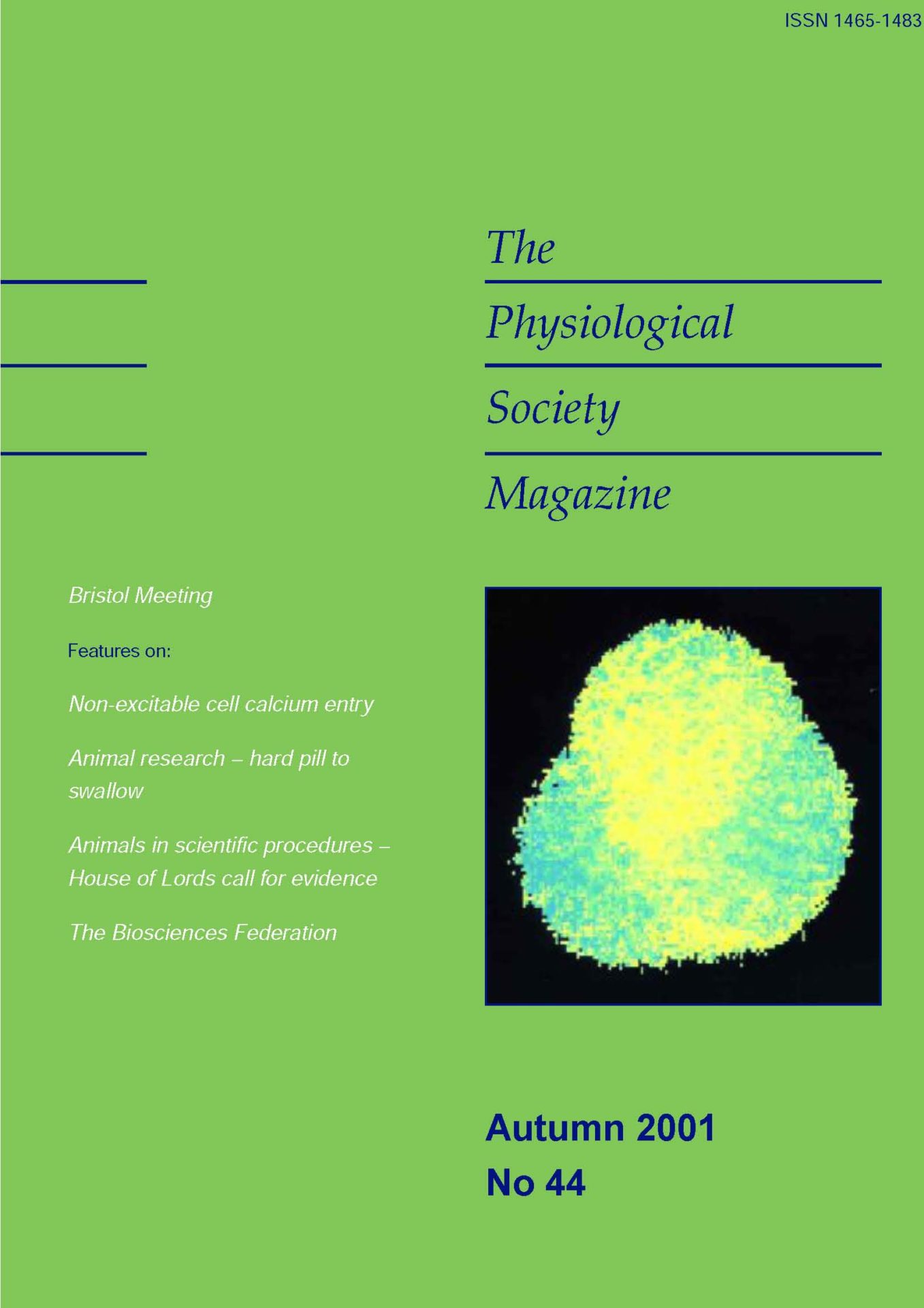
Physiology News Magazine
THE BIOSCIENCES FEDERATION – AN UPDATE
Features
THE BIOSCIENCES FEDERATION – AN UPDATE
Features
https://doi.org/10.36866/pn.44.16
Despite its scientific excellence, there is concern that the UK biosciences community is failing to realise its full potential in matters of public affairs and communication generally. It is vital that the biosciences community should play a strong and effective role in matters of research and education policy and when wider scientific issues are debated in public and political arenas.
Much is being achieved already by individual learned societies and by coordinating groups. For some time now, the Society has been an active member of the UK Life Sciences Committee (UKLSC). We are represented on the Main Committee by Chris Fry, and take a full part in the work of the UKLSC Animal Sciences Committee and the Education Group. The UKLSC provides a forum for societies in the biosciences community to work together to further their aims. It has worked well, with joint responses to government consultation on matters to do with education, science policy and animal welfare issues as well as working together on careers events and the like. The belief is that the voice of one larger umbrella body carries more weight than many responses from smaller organisations as government in particular would prefer to consult with a single organisation representing the biosciences generally.
Over a period, there has been increasing talk of a Biosciences Federation to help us realise our full potential in influencing public policy.
Last November, the Institute of Biology, the UK National Committee for Microbiology, and the UKLSC set up a working group, tasked with drawing up proposals for a UK Biosciences Federation. Members were selected from the sponsoring bodies. The Society, as well as many others, put forward the names of a number of people prepared to take part in the working group. The Linnean Society, representing societies with a broad interest in biodiversity, and the British Ecological Society, representing those with ecological interests, joined the existing three sponsors. Together, the aim is to reflect the range and diversity of UK world-class biology and its Learned Societies.
Working Group Membership
The membership includes a representative of each of the five sponsors, together with several experienced biological scientists in an independent capacity. The full membership, with substitutes where chosen is:
Professor Sir John Arbuthnott
Co-Chairman (Public Health Microbiology)
Professor David Lewis
Co-Chairman (Plant physiology/biochemistry)
Professor Robert Freedman
UK Life Sciences Committee (Biochemistry)
[Substitute: Professor Martin Raff UKLSC (Biochemistry)]
Professor Rod Herbert
Chairman, UK National Committee for Microbiology (Microbial ecology)
[Substitute: Dr Steve Moss UKNCM (Fungal Biology)]
Professor Sir David Smith
President, Linnean Society (Biodiversity Cluster) (Symbiology)
[Substitute: John Marsden Linnean Society]
Professor Janet Sprent
Vice President British Ecological Society
(Ecological Cluster) (Plant/microbial nutrition) [Substitute: Professor John Whittaker President, BES (Animal Ecology)]
Dr Alan Malcolm
Chief Executive, Institute of Biology (Biochemistry)
[Substitute: Dr Lawrence Smaje Wellcome Trust (Physiology)]
Professor Sir Brian Follett
Independent (Endocrinology/zoology)
Professor Dame Anne McLaren
Independent (Reproductive biology)
[Substitute: Professor David Cove (Plant developmental genetics)]
Dr John Norris
Independent (Industrial microbiology)
Professor Chris Pollock
Independent (Experimental plant science)
[Substitute: Dr Helen Ougham (Biochemistry of plant development)
Lord Soulsby of Swaffam Prior
Independent (Animal pathology)
Dr Brian Jamieson
Secretary
Scope and terms of reference
The task of the Working Group is to draw up a strategy and a credible business plan for a federal organisation, including costs, sources of income and detailed structure, which will be the basis for securing sufficient support from the biosciences community to proceed. It is envisaged that the Biosciences Federation will be defined as a union for a common object of many biological Learned Societies, with each retaining control of its own internal affairs.
It will develop a vision and mission along the following lines:
Vision
The Forum and Voice of UK Biosciences
Mission
The UK Biosciences Federation is a partnership of Learned Societies united by their recognition of the centrality of biology in shaping the future of society. The Federation promotes, represents and supports the UK’s world-class expertise in the Biosciences.
Method of Working
The main Working Group has set up Mini Groups to develop particular issues, notably what activities could be done more effectively at the level of a National Federation and how a Federation would relate to existing Societies and bodies. These Mini Groups will largely operate as small email networks to develop options and proposals.
Mini Group 1: Business Plan
(Chairmen: John Arbuthnott and David Lewis)
To prepare an outline business plan for the Biosciences Federation for an initial 3-year period.
Mini Group 2: Relationships with existing bodies
(Chairman: David Lewis)
To clarify the interfaces, responsibilities and working relationships between the Biosciences Federation and other bodies.
Mini Group 3: Curriculum development
(Chairman: John Arbuthnott)
To define a role for the Biosciences Federation in matters concerning secondary, undergraduate and postgraduate education and the careers of young scientists, including working methods for developing Federation policy and for influencing deliberations and decisions in this area.
Information and Consultation
The UKLSC is the conduit for information from the Federation Working Group to reach the Physiological Society. In addition, agenda and minutes of the Working Group’s meetings will be posted at the Websites of the IOB and UKLSC (www.iob.org and www.lifesci.org respectively). Officers of the Society will be invited to a major event at the Royal Society on 8 October where the group will seek the reaction of Learned Societies to the proposals and options for a federal body.
What do you think?
Formal consultation with our membership will take place when full proposals are available, but in the meantime, do you have views on these proposals? Is a federal structure a good thing? Do you have any concerns about the way plans are developing? Put your views, by email to the Magazine Co-ordinator: sgreaves@physoc.org.
